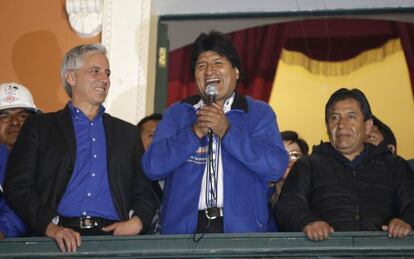Bolivia elects Morales to third term
Incumbent president's victory had been widely anticipated after watered-down campaign


Bolivians have elected Evo Morales to be their president for a third consecutive term, according to polling station surveys and flash recounts by the local media.
The leftist candidate for Movimiento al Socialismo (MAS) obtained between 59.5 percent and 61 percent of votes in Sunday’s election, according to these sources – enough to retain control of two thirds of the Assembly and over all decision making.
If he completes his third term, Morales will be the longest-serving president (14 years) in the history of Bolivian democracy, which celebrated its 32nd anniversary last week.
Although the incumbent was fully expected to obtain a decisive victory, opposition candidate Samuel Doria Medina of Unidad Demócrata obtained between 24 and 25.3 percent of the vote, nearly 10 points more than the most recent surveys had forecast.
Former president Tuto Quiroga secured nine percent of the vote, while former La Paz mayor Juan del Granado and environmentalist Fernando Vargas received around three percent each, preliminary recounts show.
After the first results came in, President Morales stepped out on to the balcony of the Palacio Quemado presidential residence to greet supporters and thank them for this new victory. Amid anti-capitalist chants, Morales asked the opposition to “work together” for Bolivia. “Let’s not engage in confrontation,” he said.
For the first time, Morales emerged the winner in Santa Cruz department, the engine of the country’s economic growth and one of the epicenters of tension during his first term in office.
Despite his leftist and anticapitalist rhetoric, Morales has applied liberal logic to the economy and adopted the roadmap that the business sector presented him with last year. Whether he keeps his promises on this front will determine his acceptance in Bolivia’s eastern territory.
Ever since he took office, Morales has made it a personal mission to break with all vestiges of the country’s colonial past
State-sponsored propaganda and Morales’ own popularity ratings, coupled with his refusal to face other candidates in a debate, made for a watered-down campaign. His main challenger was Doria Medina, a cement entrepreneur and one of the country’s wealthiest men, followed by Tuto Quiroga, a former president who now lives in the United States and managed to attract the “useful vote.”
A member of the indigenous Aymara community, Morales has worked to progressively include Bolivia’s most disadvantaged ethnic groups into the fold of society. Since 2005, this has been achieved through high prices for raw materials and hydrocarbons, which triggered an economic boom. Ever since he took office, Morales has made it a personal mission to break with all vestiges of the country’s colonial past, whether practical or symbolic – thus the choice of date for the election, October 12, which is Spain’s national day and commemorates Christopher Columbus’ arrival in the Americas.
Tu suscripción se está usando en otro dispositivo
¿Quieres añadir otro usuario a tu suscripción?
Si continúas leyendo en este dispositivo, no se podrá leer en el otro.
FlechaTu suscripción se está usando en otro dispositivo y solo puedes acceder a EL PAÍS desde un dispositivo a la vez.
Si quieres compartir tu cuenta, cambia tu suscripción a la modalidad Premium, así podrás añadir otro usuario. Cada uno accederá con su propia cuenta de email, lo que os permitirá personalizar vuestra experiencia en EL PAÍS.
¿Tienes una suscripción de empresa? Accede aquí para contratar más cuentas.
En el caso de no saber quién está usando tu cuenta, te recomendamos cambiar tu contraseña aquí.
Si decides continuar compartiendo tu cuenta, este mensaje se mostrará en tu dispositivo y en el de la otra persona que está usando tu cuenta de forma indefinida, afectando a tu experiencia de lectura. Puedes consultar aquí los términos y condiciones de la suscripción digital.








































